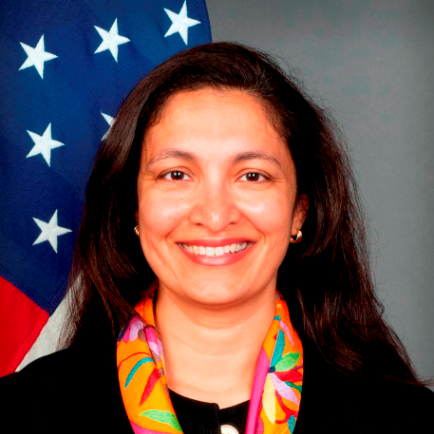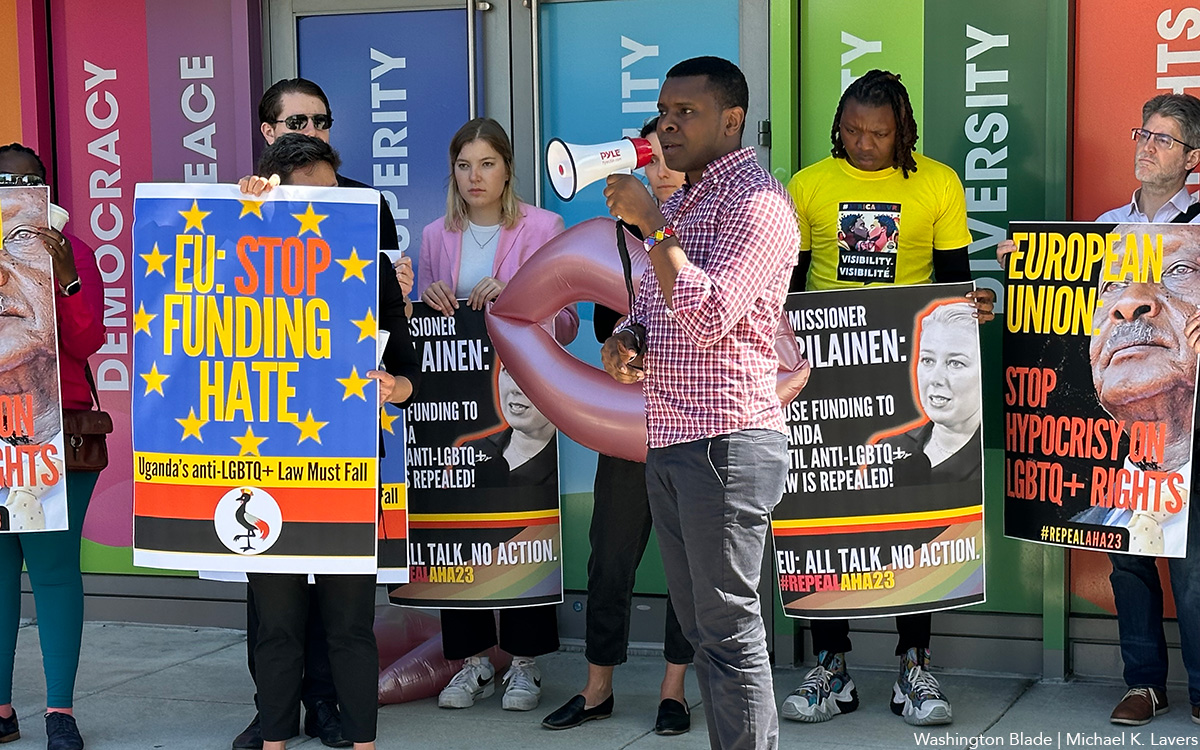News
European LGBT rights advocates gather in Croatia
Uzra Zeya of U.S. State Department addressed ILGA-Europe conference participants

Croatian President Ivo Jospović on Thursday welcomed those who attended the gathering in Zagreb, the country’s capital, in a video message.
“I take this opportunity to congratulate you on your courage and perseverance in the struggle for your right to be different, your right to be public and visible,” Jospović said.
Uzra Zeya, acting assistant secretary of the Bureau of Democracy, Human Rights and Labor at the U.S. State Department joined European Union Special Representative for Human Rights Stavros Lambrinidis, Portuguese LGBT rights advocate Miguel Vale de Almeida and other officials who spoke during the conference. Denis Dison of the Gay and Lesbian Victory Fund, Russian LGBT rights advocates Igor Kochetkov and Polina Andrianova, Neil Grungras of the Organization for Refugee Asylum and Migration and Hilde Vossen of the European Bisexual Network are among the activists who attended the gathering.
“The exchange of experiences and policy development is highly beneficial to us in Europe, as the European societies as well as the national laws differ widely across the continent,” Søren Laursen of LGBT Denmark, a Danish advocacy group, told the Washington Blade. “The activists fighting the course need to understand the differences and learn the different political realities to be able to formulate policies. An ILGA-Europe conference is a big sharing experience.”
The ILGA-Europe conference took place less roughly five months after same-sex couples began to marry in France.
Gays and lesbians can also legally tie the knot in Portugal, Spain, Iceland, the Netherlands, Belgium, Norway, Sweden and Denmark.
Same-sex couples will be able to legally marry in England and Wales in the spring, while Scottish lawmakers have begun to debate their own gay marriage measure. Irish voters next year will consider a proposed constitutional amendment that would extend marriage rights to same-sex couples in the country.
Maltese parliamentarians earlier this month began to debate a measure that would allow gays and lesbians to enter into civil unions. A Croatian parliamentary commission on Thursday approved a December referendum on whether to amend the country’s constitution to ban same-sex marriage.
The upper house of the Dutch Parliament later this fall is expected to vote on a measure that would allow trans people to petition a judge to change their gender on their birth certificates, passports and other official documents without undergoing sterilization and sex-reassignment surgery.
Activists continue to combat homophobia, transphobia
Anti-LGBT discrimination and violence in Europe remains a serious concern in spite of these legislative advances.
Nearly half of the respondents who took part in a survey the European Union Agency for Human Rights conducted in E.U. countries in 2012 said they experienced anti-gay discrimination or harassment. A quarter of respondents said they experienced violence or were threatened during the past year — this figure increases to 35 percent among trans people who took part in the survey.
The annual ILGA-Europe conference took place less than a week after police in Montenegro clashed with protesters who sought to disrupt a Pride march in Podgorica, the country’s capital.
Hundreds of Serbian LGBT rights advocates late last month criticized their government’s decision to ban a Pride march in Belgrade because of what officials described as the threat of violence from anti-gay extremists.
The European Union and the governments of the Netherlands and other member countries have also repeatedly criticized Russia over its LGBT rights record that includes a law that bans gay propaganda to minors.
“Laws that validate discrimination, as we have seen in Russia, can lead to an increase in violence and harassment,” Zeya said during her speech at the ILGA-Europe conference. “This is particularly true when authorities don’t act to protect all of their citizens and when they fail to investigate and prosecute crimes committed by or against particular groups.”
Jospović did not specifically reference Russia in his remarks, but he did stress human rights “imply the right of every human being to achieve his or her potential in that which he or she is.”
“This includes the right to freely express one’s sexual orientation and gender identity without the threat of anyone being humiliated, insulted and subjugated to violence as a result or to be excluded from social and public life,” the Croatian president said.
Saša Gavrić, executive director of the Sarajevo Open Centre, an LGBT rights group in the Bosnian capital, co-presented a workshop on responding to hate crimes in the country.
“We believe [in] high level events, like this one,” Gavrić told the Blade. “The grassroots work like our work in Sarajevo will together contribute to achieving full equality of LGBT persons in Europe.”
Members of Famiglie Arcobaleno, an Italian group that advocates on behalf of LGBT parents and those who want to have children, also presented at the ILGA-Europe conference.
Luca Possenti of the Famiglie Arcobaleno Board of Directors noted to the Blade his organization continues to work with schools and other institutions to recognize same-sex couples and their families, even though gays and lesbians remain unable to marry or adopt children in Italy. He stressed working with teachers in particular to become more LGBT-friendly is “fundamental throughout Europe” because prejudice, homophobia and transphobia remain pervasive in many European countries.
Transgender Europe, a continent-wide trans advocacy organization with more than 70 affiliates in 35 countries, also participated in the conference.
The group notes 71 anti-trans murders have been reported in Europe over the last five years. Two dozen European countries still require trans people to become sterilized before they can legally change their gender.
“The ILGA-Europe conference is one of the regular opportunities to meet, work and network in one place with many relevant stakeholders in the field of LGBTI work,” Transgender Europe Secretary Alecs Recher told the Blade. “ILGA-Europe strengthens trans representation in this meeting space and supports greater cohesion of the joint struggle for human rights on grounds of sexual orientation and gender identity.”
Politics
Survey finds support for Biden among LGBTQ adults persists despite misgivings
Data for Progress previewed the results exclusively with the Blade

A new survey by Data for Progress found LGBTQ adults overwhelmingly favor President Joe Biden and Democrats over his 2024 rival former President Donald Trump and Republicans, but responses to other questions may signal potential headwinds for Biden’s reelection campaign.
The organization shared the findings of its poll, which included 873 respondents from across the country including an oversample of transgender adults, exclusively with the Washington Blade on Thursday.
Despite the clear margin of support for the president, with only 22 percent of respondents reporting that they have a very favorable or somewhat favorable opinion of Trump, answers were more mixed when it came to assessments of Biden’s performance over the past four years and his party’s record of protecting queer and trans Americans.
Forty-five percent of respondents said the Biden-Harris administration has performed better than they expected, while 47 percent said the administration’s record has been worse than they anticipated. A greater margin of trans adults in the survey — 52 vs. 37 percent — said their expectations were not met.
Seventy precent of all LGBTQ respondents and 81 percent of those who identify as trans said the Democratic Party should be doing more for queer and trans folks, while just 24 percent of all survey participants and 17 percent of trans participants agreed the party is already doing enough.
With respect to the issues respondents care about the most when deciding between the candidates on their ballots, LGBTQ issues were second only to the economy, eclipsing other considerations like abortion and threats to democracy.
These answers may reflect heightened fear and anxiety among LGBTQ adults as a consequence of the dramatic uptick over the past few years in rhetorical, legislative, and violent bias-motivated attacks against the community, especially targeting queer and trans folks.
The survey found that while LGBTQ adults are highly motivated to vote in November, there are signs of ennui. For example, enthusiasm was substantially lower among those aged 18 to 24 and 25 to 39 compared with adults 40 and older. And a plurality of younger LGBTQ respondents said they believe that neither of the country’s two major political parties care about them.
European Union
Activists demand EU sanction Uganda over Anti-Homosexuality Act
Yoweri Museveni signed law on May 29, 2023

More than a dozen activists who protested in front of the European Union Delegation to the United States in D.C. on Thursday demanded the EU to sanction Uganda over the country’s Anti-Homosexuality Act.
Hillary Innocent Taylor Seguya, a Ugandan LGBTQ activist, and Global Black Gay Men Connect Executive Director Micheal Ighodaro are among those who spoke at the protest. Health GAP Executive Director Asia Russell also participated in the event that her organization organized along with GBGMC and Convening for Equality Uganda, a Ugandan LGBTQ rights group.
Ugandan President Yoweri Museveni last May signed the Anti-Homosexuality Act that, among other things, contains a death penalty provision for “aggravated homosexuality.”
The country’s Constitutional Court on April 3 refused to “nullify the Anti-Homosexuality Act in its totality.” A group of Ugandan LGBTQ activists have appealed the ruling.
A press release that Health GAP issued ahead of Thursday’s protest notes EU Commissioner for International Partnerships Jutta Urpilainen on March 6 announced more than €200 million ($212.87 million) for Uganda in support of “small business owners, young female entrepreneurs, agribusinesses as well as vital digital infrastructure projects in full Team Europe format with the European Investment Bank (EIB) and several member states.”
“These concrete initiatives will make a difference to aspiring entrepreneurs, Ugandan businesses and create jobs in multiple sectors,” said Urpilainen in a press release that announced the funds. “This is a perfect example of how Global Gateway can make a tangible difference for citizens and businesses and unlock the full potential of a partner country by working together.”
Convening for Equality Uganda on Tuesday in a letter they sent to Urpilainen asked the EU to review all funding to Uganda and “pause or reprogram any funds that go via government entities.” The protesters on Thursday also demanded European Commission President Ursula von der Leyen “to hold Ugandan President Museveni’s government accountable for this attack on human rights.”
Josep Borrell, the EU’s top diplomat, in a statement he released after Museveni signed the Anti-Homosexuality Act said the law “is contrary to international human rights law and to Uganda’s obligations under the African Charter on Human and People’s Rights, including commitments on dignity and nondiscrimination, and the prohibition of cruel, inhuman or degrading punishment.”
“The Ugandan government has an obligation to protect all of its citizens and uphold their basic rights,” said Borrell. “Failure to do so will undermine relationships with international partners.”
“The European Union will continue to engage with the Ugandan authorities and civil society to ensure that all individuals, regardless of their sexual orientation and gender identity, are treated equally, with dignity and respect,” he added.
Urpilainen last September in a letter to the European Parliament said the EU would not suspend aid to Uganda over the law.
Politics
Court records raise concerns about right-wing TikTok investor’s influence
Jeff Yass is a Pa. billionaire who has funded anti-LGBTQ causes

The role played by Pennsylvania billionaire Jeff Yass in the creation of TikTok might be far greater than was previously understood, according to new reporting that raises questions about the extent of the right-wing megadonor’s influence over matters at the intersection of social media, federal regulations, and electoral politics.
In 2012, Yass’s firm, Susquehanna International Group, spent $5 million for 15 percent of the short-form video hosting platform’s Chinese-owned parent, ByteDance. In the years since, as TikTok grew from a nascent startup to a tech giant with 1.5 billion active monthly users and an estimated $225 billion valuation, Yass and his firm pocketed tens of billions of dollars.
Beyond the size of Susquehanna’s ownership stake, little was known about its relationship with ByteDance until documents from a lawsuit filed against the firm by its former contractors were accidentally unsealed last month, leading to new reporting by the New York Times on Thursday that shows Susquehanna was hardly a passive investor.
In 2009 the firm used a proprietary, sophisticated search algorithm to build a home-buying site called 99Fang, tapping software engineer and entrepreneur Zhang Yiming to serve as its CEO. The company folded. And then, per the Times’s review of the court records, in 2012 Susquehanna picked Yiming to be the founder of its new startup ByteDance and repurposed the technology from 99Fang for use in the new venture.
Importantly, the documents do not provide insight into Yass’s personal involvement in the formation of ByteDance. And Susquehanna denies that the company’s search algorithm technologies were carried over from the real estate venture — which, if true, would presumably undermine the basis for the lawsuit brought by the firm’s former contractors who are seeking compensation for the tech used by ByteDance.
Questions about Yass’s influence come at a pivotal political moment
In recent weeks, federal lawmakers have moved forward with a proposal that would force ByteDance to divest TikTok or ban the platform’s use in the U.S. altogether, citing the potential threats to U.S. national security interests stemming from the company’s Chinese ownership.
The bill was passed on March 13 with wide bipartisan margins in the House but faced an uncertain future in the Senate. However, on Wednesday, House Speaker Mike Johnson (R-La.) announced plans to fold the proposal into a measure that includes foreign aid to Ukraine, Israel, and Taiwan, likely bolstering its chances of passage by both chambers.
Last month, shortly after meeting with Yass at his home in Mar-a-Lago, former President Donald Trump changed his longtime stance and came out against Congress’s effort to break up or ban TikTok. The timing led to speculation about whether the billionaire businessman was behind Trump’s change of heart, perhaps by contributing to the cash-strapped Republican presidential nominee’s electoral campaign or through other means.
Meanwhile, Yass has emerged as the largest donor of the 2024 election cycle. A coalition of public interest and government watchdog groups have called attention to the vast network of right-wing political causes and candidates supported by the billionaire, often via contributions funneled through dark money PACs that are designed to conceal or obscure the identities of their donors.
The Action Center on Race and the Economy, Make the Road, POWER Metro: Faith in Action, Free the Ballot, and Little Sis launched a website called All Eyes on Yass that features research into the various causes he supports, along with insight into the networks connecting the entities funded by his contributions.
Broadly, in Pennsylvania they fall into five categories: Advocacy against reproductive freedom and LGBTQ rights via the Pennsylvania Family Institute, lobbying on behalf of oil and gas industry interests by the Pennsylvania Manufacturers’ Association, anti-union groups supported by Commonwealth Partners, a privately owned registered investment advisory firm/independent broker-dealer, the Commonwealth Foundation for Public Policy Alternatives, which seeks to privatize public schools and defeat proposed increases to the minimum wage, and the Citizens Alliance of Pennsylvania, which advocates for lowering taxes on corporations and the rich.
Additionally, All Eyes on Yass reports that the billionaire has given massive contributions to Club for Growth and direct spending to support the electoral campaigns of right-wing Republicans including Florida Gov. Ron DeSantis; U.S. Sens. Ted Cruz (Texas), Rand Paul (Ky.), and Josh Hawley (MO); U.S. Rep. Lauren Boebert (Colo.), and former U.S. Rep. Madison Cawthorn (N.C.).
-

 Africa4 days ago
Africa4 days agoCongolese lawmaker introduces anti-homosexuality bill
-

 District of Columbia20 hours ago
District of Columbia20 hours agoReenactment of first gay rights picket at White House draws interest of tourists
-

 World4 days ago
World4 days agoOut in the World: LGBTQ news from Europe and Asia
-

 Arizona1 day ago
Arizona1 day agoAriz. governor vetoes anti-transgender, Ten Commandments bill












